My CEIBS Pre-MBA Bootcamp Experience
Considering going to CEIBS Pre-MBA Bootcamp? Read this First
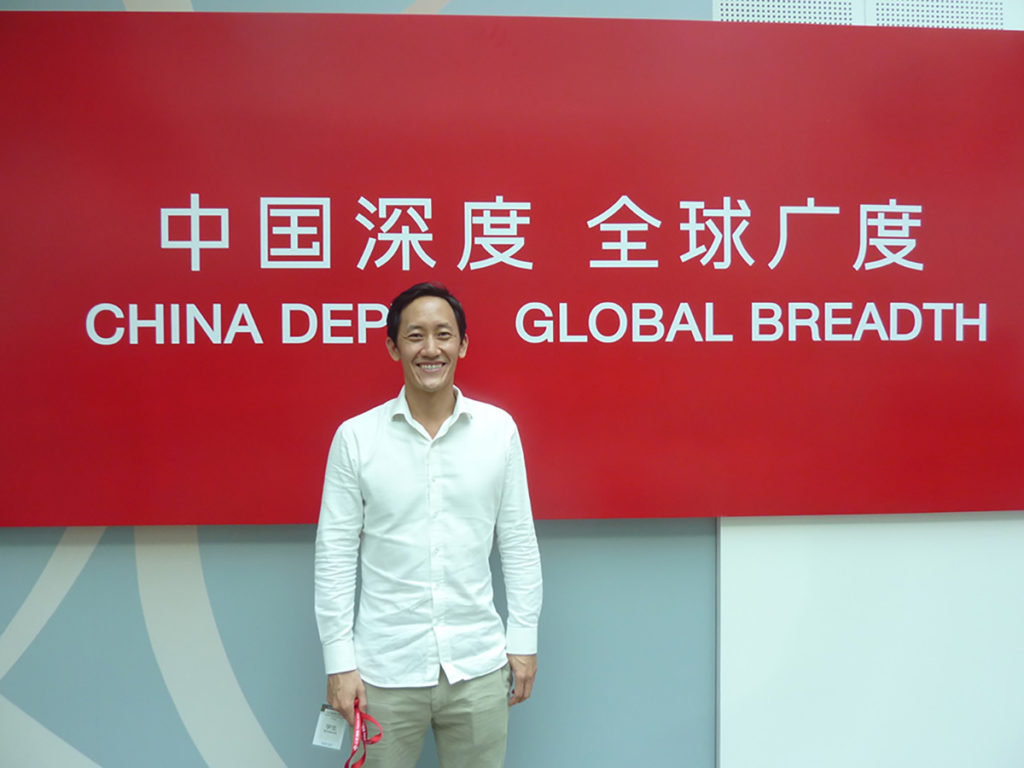
I recently participated in CEIBS Pre-MBA Bootcamp, which offers applicants a 5-day taster of the MBA experience and specifically the CEIBS MBA experience.
The purpose of this writeup is to share an on-the-ground account of the CEIBS Pre-MBA Bootcamp so future participants know what to expect.
I also think applicants considering CEIBS will get some value from this too.
For admissions insights gleaned from the boot camp, check out this podcast episode.
It’s hard to look beyond glossy MBA brochures/websites to grasp the essence of an MBA program. I hope this informal writeup – with some quickly snapped photos and videos – sheds more light on China’s top-ranked MBA.
I am grateful to CEIBS for inviting me to the Bootcamp. Overall, I felt participants walked away with a much clearer view of how an MBA – and especially a CEIBS MBA – could benefit their knowledge, network and careers.
Below is my diary of the each day’s activities – click each day for summary and reflections:
CEIBS PRE-MBA BOOTCAMP 2016
TUESDAY – registration & welcome
WEDNESDAY – introduction to CEIBS & sample marketing class (case-study)
THURSDAY – company visits & kung-fu
FRIDAY – sample strategy class, career coaching lunch, sample economics class
SATURDAY – sample political science class, afternoon tour of Shanghai, group dinner, party!
SUNDAY – entrepreneurship in China, career opportunities in China, alumni sharing, certificate ceremony
FINAL THOUGHTS – my takeaways from the week
TUESDAY
Registration
Registration took place from 2-5pm on Tuesday at the CEIBS campus.
Usually participants stay on campus during the boot camp (CEIBS Shanghai Campus has 6 dormitories and 2 residential buildings), but this year participants stayed at the Ramada Pudong Hotel. We were advised to first check into the hotel, a 15-minute walk from campus.
I had arrived in Shanghai a few days earlier to explore the city. Having studied Mandarin in Shanghai 12 years ago, I was eager to see how the city had changed. The transformation in hard (i.e. infrastructure) and soft (i.e. people, culture) power was remarkable. Shanghai had matured into one of the world’s preeminent business and cultural hubs and was ready to take the lead.
It took me about 40 minutes by cab during rush hour traffic (60 Chinese Yuan, about 9 USD) to travel from the center of Puxi (old Shanghai) to the hotel in Pudong (new Shanghai). I was left speechless by the enormous towers of Lu Jia Hui Financial Center, which were being built 10 years ago. Pudong has less character than Puxi but its open space signifies its position as the city’s new economic center of growth. Many CEIBS MBAs reside on campus in Pudong their first year, and then in their second year move to Puxi, the more happening part of town.
I dropped off my bags and ran to CEIBS to check in. Shanghai in July is humid!
The neighborhood surrounding CEIBS feels like a well-off American suburb with abundant space, western restaurants and hotels, and a quiet canal behind campus. It is one of the most expensive places to live in Shanghai.


Business school campuses feel so different in real life than in the brochure. That’s why I took this video of what is directly opposite the CEIBS campus.
CEIBS campus was designed by Pei Cobb Freed & Partners. One bootcamper from Suzhou told me the campus reminded me of his hometown, where legendary architect I.M. Pei of the aforementioned firm designed the city’s museum.
It is a quiet and secluded campus, with still flat pools and geometrical shaped buildings – a place of reflection.
Walking to registration I felt the school chock full of resources. The campus is beautifully kept, and the classrooms and meeting spaces were modern. There were signs for multiple EMBA classes (more on this soon) as well as for our bootcamp.
I arrived just before the registration closed and saw a bunch of other bootcampers excitedly trading travel stories to Shanghai. For many, it was their first time not only in Shanghai but in China. This year’s class had 63 people from 23 countries.
The MBA office had set up a WeChat group (the most popular chat app in China) which was to be the main way for the group to communicate.
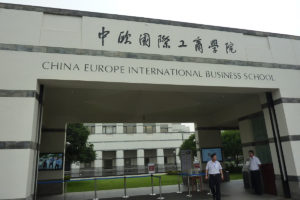
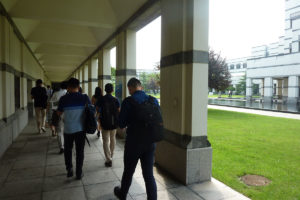
Welcome Cocktail Party
There was a Welcome Cocktail Party that night at Cantina, one of the 4-5 western restaurants/cafes on Hongfeng Lu, a few blocks away from campus.
Over tacos and margaritas I met:
- 1 German diplomat living in Bangladesh – a fan of the Touch MBA Podcast!
- 2 Singaporeans, one a lawyer the other a tax consultant
- 1 Ghanaian experiencing China for the first time
- 1 Shanghainese who had spent most of her career in Denmark
- 1 Pakistani woman who attended the country’s top engineering school
- 1 Indian-American working in the energy industry in Lagos, Nigeria
International students and Chinese students were split 50-50. The international and local Chinese students tended to stick together – no doubt due to language – but participants from both groups made efforts to get to know the other side. It was a very international and open-minded group of applicants.
Many left early to prepare for tomorrow’s first class – a 20-page Harvard Business School case-study about Sony’s dog robot Aibo. There would be cold-calls!
WEDNESDAY
Dean Shimin Chen welcomed the bootcampers and gave a quick history of CEIBS. The school had started as a joint venture between the Chinese government and the European Commission in Shanghai in 1994 to promote Chinese understanding of western business principles. CEIBS was the first business school in China to offer full-time and Executive MBA programs.
Dean Chen acknowledged that the US remained at the forefront of business education due to US economic dominance, but that this was changing with China’s emergence. Within 15 years the school had entered the Top 10 of the Financial Times Global MBA Rankings.
CEIBS slogan “China depth, Global breadth” reflects the school’s mission to offer a world-class MBA education versed in China reality while also being the most international MBA in China.
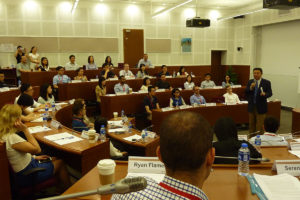
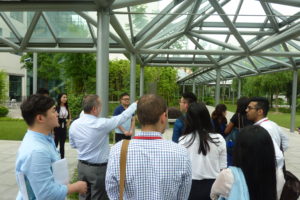
MBA Program Introduction and Tour – Roy Chason
Assistant Director of Marketing Roy Chason welcomed the bootcamp participants and had everyone introduce themselves. Most noticeable to me were: 1) the number of participants from family business 2) the international experience of both Chinese and international participants and 3) the common interest to bridge different geographies with China. Most participants were hoping that the bootcamp would give them a better idea of not only the MBA experience but potential post-MBA career goals to explore.
Roy then gave a presentation about China’s recent history. His goal: to get participants to think about China’s emergence and how their careers would cross paths with China. A central theme of Roy’s presentation – and the entire week – was China’s move from “global copycat” to “global innovator.” He challenged the class to think about which direction innovation was moving in industries like mobile, transportation, tech and banking. For example, China was supplying bullet trains to the US, and in China, paying for everyday items with mobile phones is now commonplace.
Another enduring theme of Roy’s presentation and the week was the growth of Chinese companies and their desire to hire international MBAs to expand globally. For most of its history most students enrolled in CEIBS to land jobs with Multinational Companies (MNCs) but within the past couple years, Chinese companies made up roughly half of the 380 recruiting companies coming to CEIBS.
Roy also shared his own 20-year history with China that exemplified the country’s incredible pace of change.
A number of participants shared their concerns about China’s slowing economy and future growth. Nevertheless, Roy’s message still resonated: China would likely play a big role in most of the bootcamper’s careers.
MBA Admissions Talk – Yvonne Li
Then Yvonne Li, Director of Marketing & Career Services, presented on the CEIBS MBA program. Yvonne has been with CEIBS for over 11 years (more than half the school’s history) and covered the unique points of CEIBS’ MBA offering:
- CEIBS graduates 180 Full-time MBAs. It also graduates 800 EMBA students each year, which makes the CEIBS EMBA the largest in the world
- CEIBS offers 3 coordinated degree programs and sends more than half the class each year to 35 top exchange partners
- CEIBS 70 faculty members are the most international in China
- CEIBS is beefing up its entrepreneurship resources with $100 million dollar fund dedicated to early & growth stage businesses run by CEIBS students and alumni, 4 entrepreneurship professors, 7 entrepreneurship electives, and an on-campus E-Lab incubator
- CEIBS has career reciprocity agreements with Harvard Business School, London Business School, Insead, IESE and IE – meaning students can use each school’s career service resources for 1-day if in town.
- CEIBS offers 40% of international students and 66% of local Chinese students scholarships
She encouraged applicants with less work experience to think of potential challenges: 1) generally having less to contribute in classroom discussions 2) sometimes being at a competitive disadvantage during recruiting (compared to more seasoned peers).
She challenged participants to think deeply about their MBA priorities and find MBA programs that matched those priorities.

Sample Class: Disruptive Market Positioning through Understanding Consumer Psychology – Prof. Hyun Young Park
Professor Park, who got her PhD in Marketing from NYU Stern, then led a marketing case study on Sony’s Dog Robot Aibo. The big question: should Sony market this robot in the US?
The class was broken up into 3 parts: a brief lecture on core concepts (50 minutes), case-study discussion (50 minutes) and a wrap-up (20 minutes).
It became clear that some participants had more insights to offer – and were more willing to offer those insights – than others. Communication skills were paramount. Some students avoided the professor’s questions and rambled while others elevated the discussion with their insights.
In a case-based classroom, the size of the class matters. It’s simple math. With a class of 60, even if every student participated (unlikely), that student would only get 1-2 minutes of speaking time. You have to make that time count! Having an informed perspective (yes, this includes preparation) and speaking eloquently make a big impact. Also necessary are Professors who have the energy, insight, and respect of the class to move the discussion forward.
In a case-based discussion, there are no right answers, just perhaps better way of thinking.
How to Master the MBA Interview with Barbara Coward
Barbara Coward, a former MBA Admissions Director at University of Bath and Loyola University Maryland, ended the day with her best MBA interview tips. She encouraged the participants to connect with their interviewers through listening and to be prepared – but not rehearsed – with their answers. Many participants asked Barbara about the specifics about interview preparation and how applicants are evaluated.
THURSDAY
Company Visit: Baosteel
Thursday was company visit day.
We first traveled to BaoSteel, the world’s 4th largest steelmaker. Baosteel was founded the day after China opened its economy in 1978, and now has a workforce of 150,000 worldwide. Seeing it’s production facilities, port and workers – all within an area bigger than Macau – was awe-striking.
To enter a steel factory and literally feel the heat of China’s industrial might was a highlight for many.
Company Visit: Ford
We then visited Ford’s Shanghai headquarters in Pudong. Ford is the second largest automobile producer in the US and is moving quickly to expand its presence in China – they have captured 4% of China’s automobile market so far.
After a presentation about Ford’s focus on smart mobility, and the challenges of growing marketshare in China while collaborating with tech frenemies such as Uber, CEIBS had 9 Full-time MBA alumni share more about their jobs at Ford. Nearly all had made a functional and geographical switch post-MBA, and all shared that they had made lifelong friends and widened their business perspective at CEIBS. Implicit in their presentations was CEIBS strong connections with multinationals like Ford as each of the 9 alumni worked in a different part of the business.
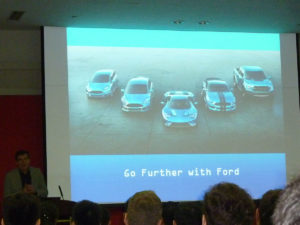
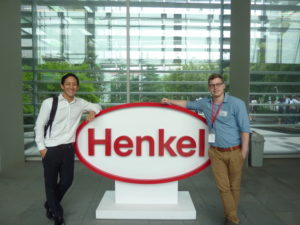
Company Visit: Henkel
We then headed to Henkel, the German producer of laundry, beauty care and adhesive products. Henkel has 50,000 employees worldwide and revenues of €18 billion in 2015. It’s Shanghai office was bright, sleek, and modern. The group got to hear presentations on the competitive FMCG market in China and opportunities in Henkel’s different business units. Henkel has a very clear path for career progression which involves geographical and functional rotations.
Interestingly, the company seemed to care less about applicants with an MBA degree but rather open-minded and intelligent problem solvers who could achieve results.
Cultural Activity: Kung Fu
It was a day full of travel and presentations but many participants still had enough energy to attend a Kung Fu class before dinner. Lots of laughs were shared as the group attempted this ancient art.
CEIBS has an indoor gym and 2 indoor floors where students can play basketball, badminton, ping pong.
FRIDAY
Friday was focused on sample classes, the first from Adjunct Professor Jeffery Sampler, who specializes in strategy and technology, and the second from CEIBS Economics Professor Bala Ramasamy. During the lunch break, students split into groups to meet with CEIBS career services consultants.
Sample Class: Ten Commandments for Competing in Turbulent Times – Prof. Jeff Sampler
After being a research scientist at MIT and then teaching at Oxford Said, Prof. Sampler has spent the last 4 years teaching at CEIBS and consulting for local & international companies in China.
He gave a captivating, interactive presentation which laid out important strategy concepts in the context of China business.
While sharing how companies like WeChat are rapidly reinventing industries, Prof. Sampler excitement about business in China was contagious. He documented how international companies are coming to China to learn innovations to take home to the West; in this case, Facebook’s efforts to be more like WeChat.
For example, on WeChat:
- 28 years of voice messages are left everyday on WeChat
- Over 16 billion “red packets” (monetary gifts to loved ones) were delivered over the Chinese New Year Holiday this year
- 1/3 of supplier deals will be done over WeChat
He urged the group to “think in billions, not millions,” and think hard about what “game” (industries, geographies) to play in their careers. Clearly he sees a lot of potential for profit and innovation in China.
Career Coaching Lunch Session
Over Subway sandwiches in CEIBS’ E-Lab, participants met with CEIBS career specialists to learn more about recruiting and post-MBA opportunities at CEIBS.
CEIBS has 7 career consultants, specializing in different industries, that offer 1-1 attention to students. Students are assigned a consultant based on their career interests in the first 4 months, after which students can work with other consultants
I listened to Ivy Yang, one of the consultants at CEIBS Career Development Center, answer prospects’ questions.
It’s not easy for foreigners to get jobs in China as the market has become more competitive in the past 5 years. Still, she said, many MNCs are looking for foreigners, and both Chinese and international firms are looking for foreigners to spearhead international expansions of their products and services.
I had 3 takeaways from the career coaching lunch:
1. The CEIBS MBA degree offers different value propositions to Chinese and to international students. Prospects should speak with students in their “bucket” to learn more about recruiting opportunities.
2. CEIBS has largest EMBA class in the world (800 each year). Many MBA students have found jobs through being helpful to EMBA alumni. CEIBS also has a mentoring program that connects students to EMBA alumni.
3. MBA students need to be focused in their career search to succeed. In Ivy’s words: “It’s a nightmare if students have more than 2-3 career directions during MBA because they miss so many opportunities.”
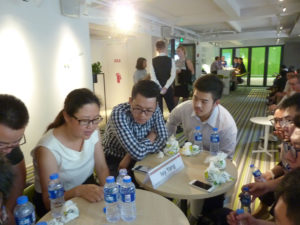

Sample Class: Economic Crisis and Long Term Economic Growth in Asia – Prof. Bala Ramasamy
Prof. Ramasamy, from Malaysia, demanded attention with his penetrating gaze and razor sharp elocution – I would fear being unprepared for his class!
Topics he covered included the role that diversity, entrepreneurial culture, and demographics play in economic development. Opinionated and provocative, Prof. Ramasamy challenged the class to think through common beliefs about China and economic growth.
One comment he made that stuck was about diversity in the MBA classroom: “MBA students are stubborn as hell. You’re not going to learn if you’re stubborn, you need to be open to other people’s views.”
Check out this outstanding writeup by Nathan Allen of Poets & Quants that focuses on Prof. Ramasamy’s class.
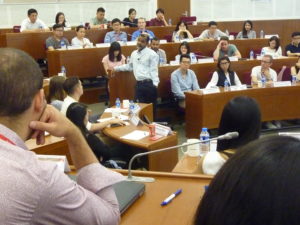
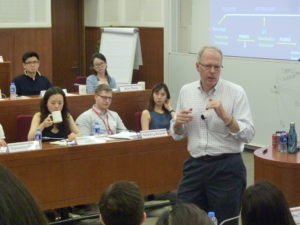
SATURDAY
Sample Class: China’s New Normal: Beyond the Headlines – Prof. David Gosset
Professor Gosset studied political science in Paris, Russia, Taipei and the US and encouraged the class to view China’s politics and economics not as black or white, but with grayer nuance.
Particularly interesting was the class discussion around China’s “One Belt, One Road” initiative that would connect China to Eurasia and East Africa, essentially a 21st Century Silk Road that would involve 60 countries and potential investment of 8 trillion dollars. This would involve a huge development fund and Asian Infrastructure Bank that would position China to play a pioneering role in global economic development, much as the US did after World War 2. The class debated the magnitude and implications surrounding this development.
Tianzifang
We then spent a couple hours at Tianzifang, an arts center housed with a labyrinth of old buildings and alleyways. Now a major tourist attraction, there are many shops, bars and restaurants as well. After cruising around for an hour a few of us stopped for drinks to enjoy the Saturday afternoon.

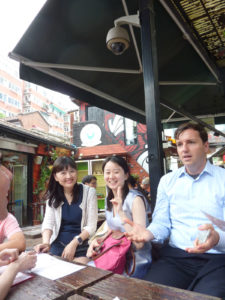
Grand Dinner at Naked Hub
Nearby to Tianzifang, was Naked Hub, a gorgeous coworking space with an open tap, comfy couches, and even a rooftop patio with a beautiful view of Shanghai.
Even on a Saturday night, small packs of entrepreneurs surrounded us as we learned more about NakedHub and the entrepreneurs there. Interestingly, many large companies are sending their innovation teams there to work, mingle, and soak in the disruptive start up culture.
The group feasted on some spicy Indonesian food for dinner and made post-dinner plans for bar-hopping or KTV.
SUNDAY
Entrepreneurship in China – Jesse Miller & Vincent Chung
Saturday was a big night out, but just about all the participants were on time for Sunday’s 9am session. Jesse Miller and Vincent Chung, students at CEIBS and both aspiring entrepreneurs, discussed CEIBS E-Lab Incubator, launched in 2015 to support entrepreneurship at CEIBS, as well as their startup experience in China.
Jesse, an American, laid out the macro case for starting a business in China: the government’s commitment to launch 300 incubators by 2020, lack of other investment channels for a growing middle and upper class, and affordably talented labor.
Vincent, from China, discussed his plans to build and scale “smart gyms” in China. Many startups – like his – are trying to capitalize on China’s growing demand for higher end brands and products. His presentation struck a nerve with the Chinese participants, who peppered him with questions during and after his presentation.
Career Opportunities in China – Jeffery Pi
Jeffrey, who graduated from CEIBS in 2008, discussed 6 mega-trends in China and shared his inspirational career transformation from a video editor in Canada (pre-CEIBS) to COO for a large Chinese entertainment company that IPO’d (post-CEIBS). He is currently serving as one of CEIBS career consultants.
Jeffrey made it crystal clear that CEIBS MBAs will need to “leave no stone unturned” – as he did – to achieve their post-MBA goals. They need to work hard to acquire the skills, knowledge, experience and contacts to make their intended career switch. With CEIBS relatively small size of 200 students, the career team reviews each MBA student weekly to monitor their progress.
Alumni Sharing
3 CEIBS alumni, now living in Shanghai, shared their best advice and answered questions from the boot-campers, including their least favorite parts of the CEIBS experience.
Denise (Taiwanese, former CEIBS class president, working on startup to help female travelers)
Best Advice: put in the effort to learn Chinese and mix with local Chinese students
Least Favorite Part: the CEIBS canteen food
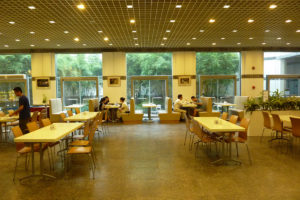
CEIBS On-Campus Canteen
Ibon (Spaniard, working for Google)
Best Advice: Know that China is the most innovative place for tech in the world
Least Favorite Part: Saturday classes
Ted (American, working in investment banking)
Best Advice: if you’re a foreigner, know companies are going to see you that way too, so seek roles where you can provide the most value
Least Favorite Part: CEIBS Pudong location, as most of Shanghai’s social activities take place in Puxi, 30 minutes away by taxi
Wrap-Up and Certificate Ceremony
What a jam-packed 5 days! Many friendships were formed as participants got to know each other inside and outside class. Hugs and promises to keep in touch were exchanged.
Most of the group would head home or to the Pudong International Airport, 20-30 minutes away.
Every participant I spoke with felt like the boot-camp had helped them to better understand the MBA experience as well as what it would be like to study at CEIBS. Nothing beats stepping foot on campus. And in this case, they got to sample 4 classes, meet the entire CEIBS MBA and Career Services teams, learn from CEIBS alumni, visit local and multinational companies in China, and meet 60+ other bright aspiring applicants from the around the world.
Not all will end up applying to CEIBS, but I know many were grateful for the experience.
2 months later, the WeChat group is still active, with participants meeting each other in different countries, making business partnerships and sharing advice. I’ve heard that cohorts from previous bootcamps 3-4 years ago are still active too.
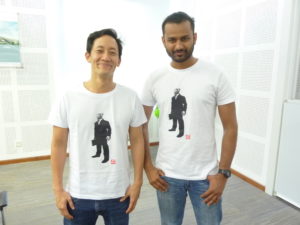
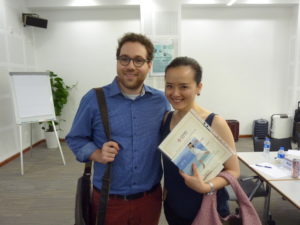
FINAL THOUGHTS
I would strongly recommend the CEIBS Pre-MBA boot camp experience. Not only to experience an MBA classroom, but to see the amazing change and unique business environment in China, and to meet a group of similarly-minded peers – some of who could become great friends or even business partners.
I know more than a handful of the participants plan to attend CEIBS, and every participant walked away with a much more educated opinion of CEIBS and MBA programs in general.
The key themes to me were:
1. China, Global Copycat to Global Innovator
This was a key marketing theme of the CEIBS office, but you could feel it on the ground. At our hotel ATM you could top up your phone with money. All the buses and motorbikes I could see were electric-powered. Over the course of the week, we met academics, entrepreneurs, MBA students, and businesspeople from all over the world who were here to make their dreams come true. All spoke to the dizzying pace of change in Shanghai and immense business opportunity – even with China’s slowing economic growth rates. More local Chinese companies were looking to recruit MBAs to bring their products overseas.
2. CEIBS EMBAs Make Up Most of the CEIBS Network
CEIBS graduates 800 EMBAs each year and boasts over 2,000 CEOs among its 16,000 alumni. Sure, your best friends – and likely your craziest memories – will be from the Full-time program. But the EMBA network is the most powerful part of the CEIBS network. Most of the EMBA students are Chinese speakers – how can you network and build relationships with this part of the student body?
Learning Chinese – even just making the effort – is hugely important to career success in China.
3. Attending CEIBS is a Bet on the Future
Although it’s the top-ranked program in mainland China, CEIBS doesn’t carry the brand power of the top 10 US programs. Investing in the CEIBS MBA is a bet on the future – that you can gain a deep understanding of China business, grow a powerful network in the country, and access China-related opportunities post-MBA. All at a materially lower cost than top 2-year US MBA programs. You’ll also be joining other international students with the same mindset and top local students looking for an international MBA experience.
For €1350 I felt the CEIBS Pre-MBA bootcamp was good value as the fee included all classes, activities, meals, and 5 nights at the Ramada, a 4-star hotel. Scholarships are available too if you apply earlier. You’ll have to pay your airfare and travel to/from airport (public transportation to Pudong airport is cheap). If you’re seriously considering international and Asian MBA programs, I think the Bootcamp is a good investment – those applying to CEIBS will get a leg up, and at the very least it will help you make better decisions about where to apply and attend.
If you have questions, feel free to post in the comments.

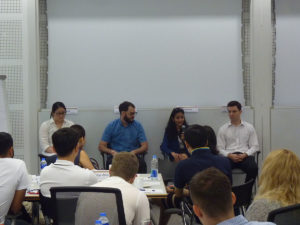
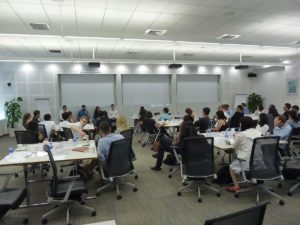
3 thoughts on “My CEIBS Pre-MBA Bootcamp Experience”
Pingback: #115 Charting Your Own Path in China with Jesse Miller, CEIBS MBA '17 - » Touch MBA
Wooow this is totally amazing. I did not know about the boot camp until today when I joined a WebEx meeting organized by Elizabeth Chweya. Thank you for great insights.
Definitely apply and go if you can! It’s a great way to preview what top MBA programs are like and the CEIBS MBA, of course. Plus you’ll make a ton of friends.